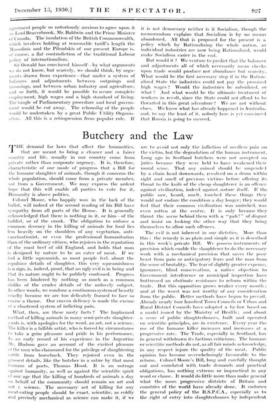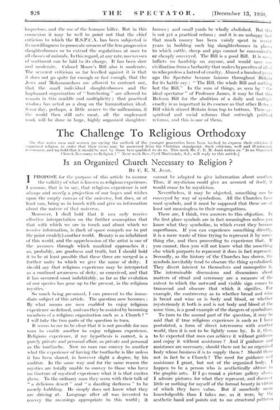Butchery and the Law
ril.RE demand for laws that affect the humanities, -I- that are meant to bring a cleaner and a fairer country and life, usually in our country come from private rather than -corporate urgency. It is, therefore, characteristic of our mode of progress that a Bill for the humane slaughter of animals, though it concerns the whole population, should come from a private member, not front a Government. We may express the ardent hope that this will enable all parties to vote for it. Humanity is above politics.
Colonel Moore, who happily won in the luck of the ballot, will indeed at the second reading of his Bill have sympathy from all parts of the House. It is generally acknowledged that there is nothing in it, or him—of the faddist, or of the crank. The obligation to enforce a common decency in the killing of animals for food lies less heavily on the shoulders of any vegetarian, anti- vaecinationist, or even the professional humanitarian than of the ordinary citizen, who rejoices in the reputation of the roast beef of old England, and holds that man is designed by nature to be an eater of meat. If we feel a little squeamish, as most people feel, about the repulsive details of slaughter, this very squeamishness is a sign, is, indeed, proof, that an ugly evil is in being and that its nature ought to be publicly confessed. Progress has been hindered by nothing so much as a common dislike of the cruder details of the unlovely subject. In other words, we condone a continuous system of beastly cruelty because we are too delicately framed to face so coarse a theme. Our craven delicacy is made the excuse of a chartered system of inflicting pain.
What, then, are these nasty facts ? The haphazard method of killing animals in many semi-private slaughter- yards is, with apologies for the word, an art, not a science. The killer is a fallible artist, who is forced by circumstance to take a grim pleasure and pride in his performance. la an early record of his experience in the Argentine Mr. Hudson gave an account of the excited pleasure or the men who clamoured for the privilege of slaughtering cattle from horseback. They rejoiced even in the grossest details, like the butcher in a satire by that most humane of poets, Thomas Hood. It is an outrage against humanity, as well as against the scientific spirit or our 'age that the killing of hundreds of animals a day on behalf of the community should remain an art and not r. science. The necessary act of killing for any meat-eating people should be exact, scientific, as coldly and precisely mechanical as science can make it, if we are to avoid not only the infliction of needless pain on the victim, but the degradation of the human instrument. Long ago in Scotland butchers were not accepted On juries because they were held to have weakened their moral sense. That any animal should be suspended by a chain head downwards, revolved on a drum within sight and smell of previous victims before offering its throat to the knife of the cheap slaughterer is an offence against civilization, indeed against.nature itself. If the public saw, heard, smelt, touched these things they would not endure the condition a day longer; they would feel that their common civilization was smirched. was es-en rotten at the centre. It is only because they thrust the scene behind them with u "palm !" of disgust and insist on looking the other way that they bring themselves to allow such offences.
The evil is not inherent in our dietetics. More than this : the remedy is as plain and simple as it is described in this week's private Bill. We possess instruments of precision which enable the slaughterer to do the necessary work with a mechanical precision that saves the poor beast from pain or anticipatory fears and the man front the sense of brutality. The fear of slightly greater expense, ignorance, blind conservatism, a native objection to Government interference or inunieq cal inspection have buttressed an obstinate resistance to reform within the trade. But this opposition grows weaker every month ; and at the worst was not worthy of any consideration
from the public. Better methods have beg to prevail. Already nearly four hundred Thwn Councils or Urban and Rural District Councils have adopted a by-law based on a model issued by the Ministry of Health ; and about a score of public slaughterhouses, built and operated on scientific principles, are in existence. Every year the use of the humane killer increases and increases at a progressive rate. The Trade, especially in Scotland, has in general withdrawn its factious criticisms. The humane or scientific methods do not, as all fair minds acknowledge, in any respect injure the quality of the meat. Public opinion has become overwhelmingly favourable to the reform. Colonel Moore's Bill, long and carefully thought out and correlated with trade demands and practical obligations, has nothing extreme or impractical in any word or clause. It would do little more than make general what the more progressive districts of Britain and countries of the world have already done. It endorses the general policy of the R.S.P.C.A., especially as to the light of entry into slaughterhouses by independent inspectors, and the use of the humane killer. But in this connexion it may be well to point out that the- chief criticism to which the R.S.P.C.A. has been subjected is its unwillingness to prosecute owners of the less progressive slaughterhouses or to extend the regulations at once to all classes of animals. In this regard, at any rate, no excesses of sentiment can be laid to its charge. It has been slow and moderate. Colonel Moore's Bill also is moderate. The severest criticism so far levelled against it is that it does not go quite far enough or fast enough, that the Jews and Mohammedans are allowed to contract out, that the small individual slaughterhouses and the haphazard organization of " butchering " are allowed to remain in this muddle and multiplicity ; that practical wisdom has acted as a drag on the humanitarian ideal. Smile day, perhaps, a little nearer to the millennium, if the world then still cats meat, all the unpleasant work will be -done in large, highly organized slaughter- houses ; and small 'yards be wholly abolished. But this is not yet a practical reform ; and it is-an unhappy fact that much money has been vainly spent in recent years in building such big slaughterhouses in place; to which cattle, sheep and pigs cannot be conveniently or cheaply conveyed. The Bill is a good Bill. It is sea, inflicts no hardship on anyone, and would save our civilization from a barbarity that makes hypocrites of all of us who profess a hatred of cruelty. Almost a hundred years ago the Spectator became famous throughout Britain for its battle cry : " The Bill, the whole Bill and nothing but the Bill." In the sum of things, as seen by " the ideal spectator" of Professor James, it may be that this Reform Bill for the abolition of a daily and multiple cruelty is as important in its essence as that other Reform Bill which stirred Britain from top to bottom. There or., spiritual and social reforms that outweigh political reforms, and this is One of them.















































 Previous page
Previous page